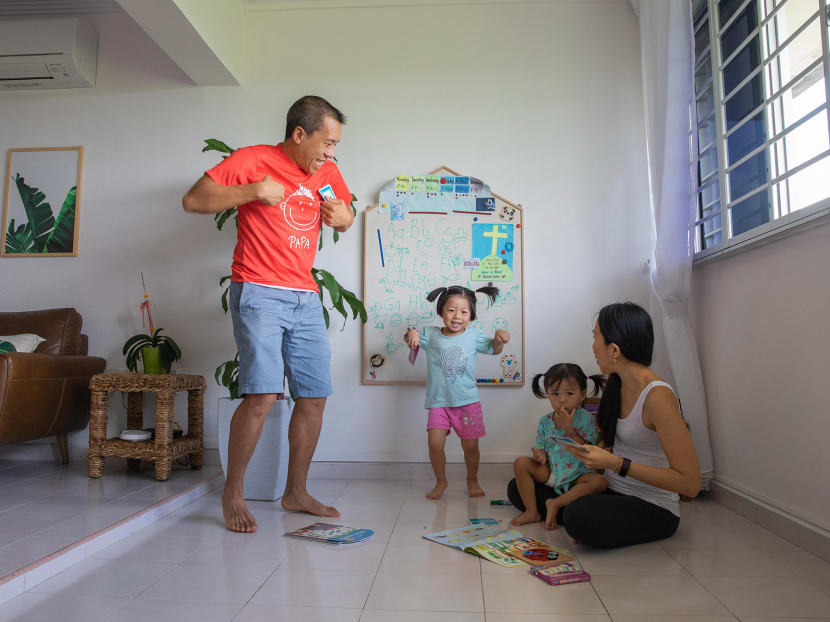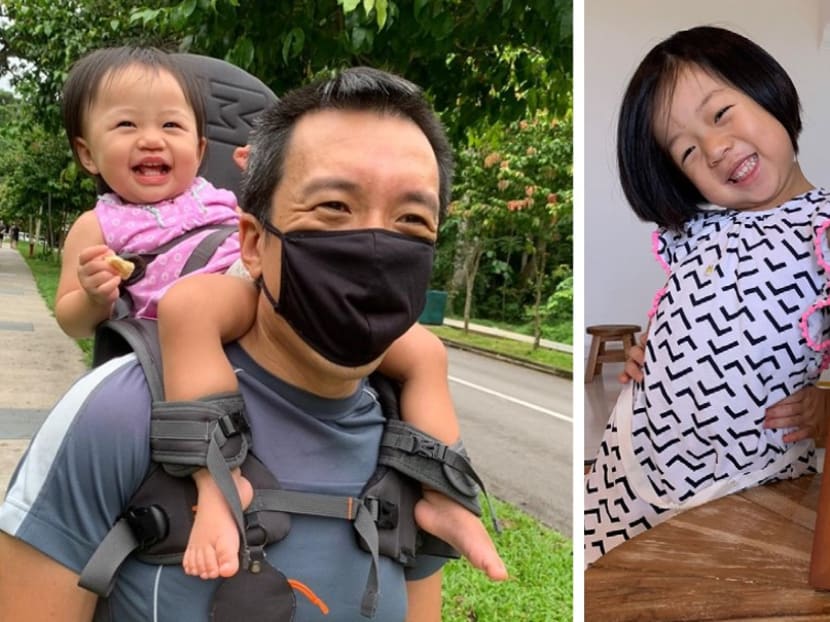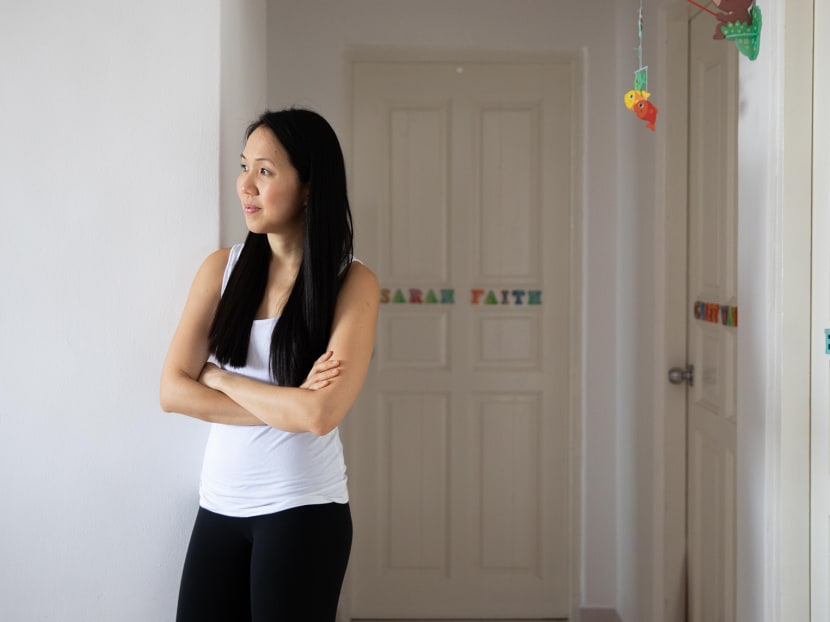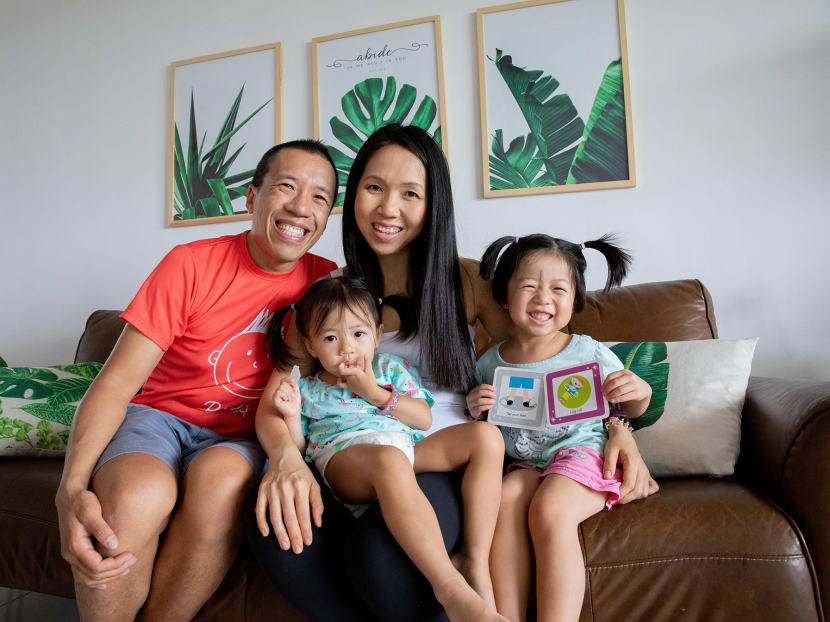My husband is a stay-at-home dad. This is my journey with him as a sole breadwinner
My eyes dammed with tears when I read the recent commentary by Kelvin Seah, entitled “It wasn't easy to convince myself I am ‘masculine and useful’ as a stay-home dad”.
My eyes dammed with tears when I read the recent commentary by Kelvin Seah, entitled “It wasn't easy to convince myself I am ‘masculine and useful’ as a stay-home dad”.
As a working mother who co-homeschools our two toddlers with a stay-at-home-dad, I felt myself unfurling inside as I read Mr Seah’s thoughts.
Since our return to Singapore in mid-2019 from my further studies overseas, where my husband had served as a pastor, we had swapped roles, with my returning to full-time work to serve out the remainder of a bond I had as a doctor with the Government.
Given our frequent moves — eight across four countries in eight years — and a desire to continue long-term humanitarian work in developing countries, we decided we would, at any one point, have one of us present at home to raise our children till they were older.
My husband, Cliff, made the brave decision to be a full-time stay-at-home dad, while juggling his theological masters degree online.
We did not realise what we were in for.
Back in Singapore, where a significant part of childcare is typically outsourced to daycare centres and domestic helpers in dual-income families, we found ourselves swimming against the current.
We could do this, we told ourselves with false bravado, only to find ourselves gasping for air.
I remember the human resources (HR) manager’s look of horror when she learned of me being the sole family breadwinner.
“No maid? Homeschooling? You have a house husband?”
I flushed instantly, bristling under the look of veiled amusement heavy-laden with pre-judgments and prejudices.
Did she think I was an aggressive feminist, or an irresponsible, absentee mother?
I curtailed the conversation quickly, swerving it sharply in a different direction. I emerged from the HR office nauseous with relief, struggling to hold in my dignity.

At the beginning of this new arrangement, my husband was stoic. When I came home after work, he would reply with good cheer, meant to assuage me he was adjusting well. But something was brewing, and I felt a foreboding.
My eyes stung when my husband came home one day and shared how a supermarket cashier had said to him, laughing: “You come here all the time. You must be a house... a house husband!”
I could sense in his tone, a strained nostalgia, searching for remnants from a past that was no longer there.
Once an IronMan triathlete who was also a cancer survivor with a career in information technology, his shoulders had slumped forward, burdened by lingering losses.
There were arcs under his eyes, darkened by night awakenings by our children, so that I could have enough rest for work the next day.
I began to see how hard this was, this taking on a new self in a society that did not celebrate or embrace fathering as a full-time job.
I did not feel entitled to give advice.
At least, for a great many hours a day, I was free to reinvent myself to be someone else, someone useful, valuable to society. Work was a carapace that kept me safe.
We kept telling each other this season would pass, that all we had to do was to support each other.
But I would return home from work, finding the air tense, wrinkling with swollen silence.
Once, emerging from his room hours later, he felt ready to share with me incidents of grown-up families pointing at him that week, guffawing at a father who had a carrier and baby on his shoulders, with a toddler in tow.
“A group was taking photos of me. I feel like an animal exhibit in public.”
I learned to listen quietly, without comforting him, careful not to wave my privilege callously.
The uncomfortable incidents had wedged themselves awkwardly between us. Our feelings, unaired, were wrapped in our shared privacy. Who would understand?
We turned to faith-based, non-profit organisations, fathers’ groups and playgroup communities, hoping to find a resonance to our shaping of longings, a sense of community.
But it was futile.
We combed parent-accompanied drop-in playgroups, only to find most, if not all of them, labelled “Mums and Tots”.
A few of them welcomed dads as well but did not state so until we asked.

I tried to put myself in his shoes.
Working, homeschooling, cooking, doing chores and being an encouraging wife never felt harder. I found myself wading through cesspools of guilt.
When Covid-19 hit Singapore, my return to the frontlines as a medical professional to help with the migrant worker outbreak was hard on our family, but proved, miraculously, to be a turning point.
With the world thrown into deep mourning, our own losses seemed acceptable.
Nothing much had changed, but a renewed purpose had lit my husband’s eyes.
Amidst the growing pandemic, he was growing a strange glow, a buoyancy of resilience amidst crisis.
As word went round that I had returned to frontline work because of his encouragement in spite of his immunosuppression from previous cancer, he began to receive messages of encouragement affirming his role as a father, holding the fort, raising a new generation of children who would have the luxurious privilege of having an involved father.
His sacrifice, strength, fortitude and courage had made all the difference to our lives.
Things began to get better when my husband shared his story in September 2020 in an online article that went viral.
People started to understand and began to reach out to connect with piquing interest.
We found friends who spoke with cadenced compassion, without the barbed tones of subtle accusations suggesting that if only we slid into the roles of social norms, things would be better.
My husband would leave with a feeling of having been fortified, not undermined. The conversations we longed for brought familiar and exquisite epiphanies.
Then, my government bond ended. The world exploded with possibility. We could now reverse our roles if we wanted to.
But by then, the growing community around our family had begun to heal us, change us.
My husband’s revelations about the central role of fathering evolved into his masters thesis in his theological studies.
He began to conduct online webinars for youth struggling with healthy relationships. He was convinced of the value of his role, not only as a husband and father, but in community.
We each chose, re-chose our roles, this time with renewed perspective.
I scaled back to part-time work as a public health administrator, and while we weren’t sure if four of us could thrive on a single part-time income, we looked forward to making it work.
Days were becoming joyful, filled with ease and purpose. My husband and I enjoyed our roles and saw our children flourish.

Nonetheless, I kept my role as a homeschooling mum tightly under wraps at work, uncertain of the envy or disdain I might receive. Would my seniors think less of me, see me as less competent?
Today, our days are undergirded with joy, buoyed by robust teamwork.
With deeper understanding from a supportive community, we are learning how to thrive counter-culturally amidst a society with circumscribed gender roles in parenting.
We have learned to answer questions without apologising, with faces of unabashed resolve.
Still, I wonder how long we will hold out for, if society does not begin to embrace this generation of more involved, hands-on fathers.
At a recent bank visit, my husband was asked to fill up his occupation on the banking phone app. He noted that while there was a dropdown option for “housewife,” there was no “stay-at-home dad” or gender neutral option available.
“So what did you put in the end?” I asked.
“Others.”
On many days, I dream of a world where fathers and mothers can unapologetically be who they are in their parenting roles, celebrating one another’s gifts to offer without the burden of gender expectations.
I long for the day where boardroom conversations about career advancement for women, also include conversations about making hands-on parenting and stay-at-home-fathering an increasingly acceptable part of our culture.
I concede this may be a faraway dream.
But don’t we wish to raise girls who do not believe they have to curtail their ambition in order not to emasculate men and to raise boys who are secure enough to rise up to the call of full-time stay-at-home fathering?
Don’t we want to see men and women flourish equally in both the workplace and home, giving them freedom to toggle seamlessly between different seasons of their lives in flexible permutations?
Then perhaps, saying yes to doing the hard work of redefining our culture at the intersection of parenting and gender equity is a step in the right direction.
Most of all, we can shift our mindsets on an individual level, to embrace hands-on fathering as a valuable, respectable choice that adds incredible value to our world.
On Father’s Day, my four-year old drew not one, but four cards for Papa, with each one celebrating his strength.
I know that someday, when our two little ones grow up, my husband would have left behind not a legacy of wealth, or status or success defined by the world, but a legacy of culture-shaking, hands-on fathering that not only upended entrenched social norms, but left behind the most important legacy of all, of lives forever changed.
ABOUT THE AUTHOR:
Tam Wai Jia is a doctor. Her husband Cliff left his career in IT and pastoring to be a stay-home-dad and is in the midst of completing his theological studies. Together, they parent two daughters, aged four and two.










